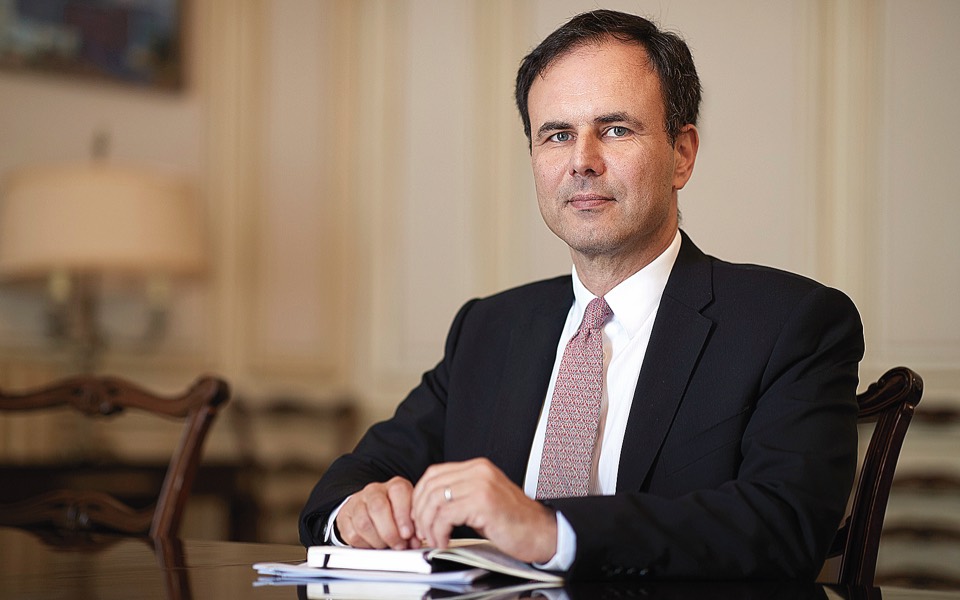PM’s chief economic adviser, Alex Patelis, sees silver lining for economy

Persisting with economic reforms, as well as tax cuts, is the antidote to the effects of the virus on the economy, Prime Minister Kyriakos Mitsotakis’ chief economic adviser Alex Patelis tells Kathimerini. With over three decades of experience as an economist, analyst and strategist with international firms, Patelis responded to the prime minister’s call and took over the key post with the main goal of contributing toward attracting investments. He believes that successfully fighting the coronavirus will form a good basis for building for the future, with a focus on the reform agenda. He says investors are still looking at Greece and want to make sure that the government does not stray from its path as a result of the lockdown and its impact. He indicatively mentions the environment bill and the great interest there is in investments in renewable energy sources.
In his first interview with a Greek media company, Patelis confirms that the government still intends to reduce social security contributions, possibly as part of the European Recovery Fund, while he also mentions that accelerated depreciation allowances could be adopted and a temporary reduction in the advance corporate tax is on the table.
He does not share the most pessimistic recession forecasts but does express concern about rising unemployment, while he is in favor of adopting further incentives to limit it. At the same time, he stresses the need to prevent a new fiscal derailment, which could trigger a new debt crisis.
Would you hazard a prediction for a recession?
That we will not be the worst performers, as is forecast by the International Monetary Fund and the European Commission. For example, the European Union’s monthly survey showed that Greece’s economic sentiment index fell less than that of any other country in April. And the literature, for example regarding the Spanish flu of 1918, shows that the better you do in fighting a virus, the better the economic outcome is also over time.
Of course we still have an increase in unemployment ahead of us and that is something that concerns us. That is why we will soon be adopting an employment support mechanism whereby the state will subsidize employment instead of unemployment. And we must also seek other incentives for job creation.
Is tourism the biggest challenge this year? Will Greece’s good performance during the first phase of the health crisis work in the country’s favor?
As with every problem that this government has faced, we are working on a plan for tourism too. Tourism Minister Haris Theocharis is currently working on it. It will contain protocols and procedures and is a very serious initiative and will also be proposed to other countries.
Having said that, as an economist, I do not analyze an economy as the sum of its sectors, such as lawyers, industry, tourism, catering etc. I have a top-down macroeconomic approach: Can we contain the health crisis? So far, so good. And this good performance is reflected both domestically and internationally. For the first time since the crisis broke out in Greece 10 years ago, 85% of Greeks now say the country is heading in the right direction. We are again proud to be Greek – and why not? – because our country has proven that it can do better than others.
You have seen the various international media reports on the “surprise” of the global health crisis. Until now, foreigners had perceived us as a weak link. We smashed this prejudiced view that many had of us. Our country has been invited to participate in an initiative of nine countries (Austria, Australia, New Zealand, Singapore, Norway, the Czech Republic, Israel, Denmark and Greece) that will cooperate on Covid-19 issues. We had our second teleconference on Thursday. Greece is no longer part of the problem; it is now part of the solution.
This I firmly believe will prove a very important legacy, when things return to normal, which will lead to more investment and interest from foreigners. And why not also for Greece as a second or first residence?
Similarly, we should be attracting foreign tech companies. A circular implementing the taxation of stock options at 15% is being issued. And soon provisions will come into force that will encourage innovation and technology companies with tax incentives. And the third piece of the puzzle is, of course, human resources.
Here I want to say something more speculative. It is possible that one legacy of this crisis will be the beginning of the reversal of the brain drain. For the first time, Greece has been more attractive during a crisis than many other countries.
But let’s not get ahead of ourselves. This government was elected on a reform platform, and reforms are what we need to do. The easy times for the global economy are over.
Will you carry out reforms in the midst of a pandemic?
Of course. The crisis is a unique opportunity to do things that we have been saying must be done for so many years and we have not succeeded in doing: upgrade our health system, introduce tele-education and teleworking, have tax authorities respond by email, abolish the use of faxes in government.
The government plans to have a total of 26 bills voted on by the end of July. The environment bill reduces the waiting time for a permit from six to eight years to 100-150 days and modernizes the RES framework. And, believe me, from my discussions with foreign investors, I can tell you there is tremendous interest in renewable energy sources.
Likewise, the zoning bill is coming, which corrects many distortions. The bill on the shadow economy that unifies oversight agencies with the aim of combating tax evasion. The Digital Reform Ministry will provide each of us with a unique personal number with which to conduct all our dealings with the state. And government agencies will now be obliged to issue their documents electronically as well. All this increases the productivity of the economy, which is the only way for long-term growth.
A very important reform is the bill that will soon be submitted on private debt, the new single insolvency framework. The concept of a “second chance” is introduced and procedures are accelerated because it does not make sense to drag out stuff in courts for years.
We must fight corruption. This year marks two years since the Folli Follie scandal, and key witnesses have yet to be called. This is a complicated case. And the justice system is independent, and no government can and should interfere with it. The Ministry of Finance has been working on the bill to upgrade corporate governance. And we are giving more organizational weapons to the Hellenic Capital Market Commission and legal protection of temporary boards of directors in specific cases. We cannot tolerate improprieties. This is important for investors. But above all, it is our obligation toward those that are weaker and to create a sense of justice. There is no economic growth without justice.
In education, we are introducing new subjects at school, including volunteering, entrepreneurship, sexuality and diversity. We need more women in the labor market – the president of the Republic alone is not enough. We have an obligation to give all Greeks equal opportunities and opportunities to develop without discrimination, and this will help economic growth. Diversity has a positive effect on the business environment. I don’t know if you know, but Europride, the joint event of all European pride celebrations, had been scheduled to take place in Thessaloniki for the first time in June, but was postponed due to Covid-19. However, we are working to organize an online conference on human rights in the workplace.
Another bill that will soon be put to consultation concerns charitable organizations and volunteering. If you look at the recent Dianeosis survey, you will see low confidence in NGOs. This is unfair because there are excellent agencies that do amazing work and it is our duty to support them. Social cohesion is an integral part of economic growth.
Apart from the reforms, does the government intend to proceed, at a later stage, with the cuts in taxes and social insurance contributions it had planned before the crisis?
It is even more important than before to create good jobs and attract investment. High insurance contributions discourage new jobs and encourage both tax and social insurance evasion. So we need to reduce them, but of course only within our budgetary capabilities. One idea would be to do it through the European Recovery Fund. We will see.
Other interventions, which do not have such a high fiscal cost, such as pre-election commitments to amortization or accelerated depreciation, could be legislated in advance. We are looking at the advance tax.
What do you have to say about the measures taken so far by the EU and about the expected Recovery Fund?
We are still in negotiations, so allow me to be careful in what I say. Greece’s position is clear: If we are talking about a “colossal” crisis “without precedent” – words that have been used repeatedly – then the answer must be equally colossal and unprecedented. And of course creating bureaucratic programs that simply increase debt doesn’t make sense, and that’s why we’re fighting for extensive use of grants, and not loans. It is also important to have flexibility. Finally, all of this needs to be done quickly without delaying tactics.
Is the Eurobond a lost dream for Europe? And is the European project in general in danger, due to a timid reaction to this crisis?
If I had a euro for every time I heard those words… I am a deep Europeanist and I believe that Europe is constantly moving forward. If, for example, we see how quickly things have happened during this crisis and compare it to previous ones, we will see that we are constantly moving forward. Fiscal rules have been eased, the state aid framework, structural fund flexibility, the ECB’s reaction, the SURE program, which for the first time introduces a common approach to unemployment, and now the creation of a new recovery fund, all in two to three months. I remind you of the initiative in favor of the Eurobond co-signed by the prime minister. Behind the bravado in the newspaper headlines there is an understanding on the part of all the countries of the seriousness of the situation and the effort to find solutions while always respecting our diversity and our interdependence. It would be a shame if we agreed on everything.
Are you afraid of a new debt crisis, which could, for example, be triggered by Italy? What can we do to prevent it?
We have gone through a 10-year crisis that had its roots in fiscal derailment. We must never allow this to happen again. It is simple what we need to do: Remember every day that money doesn’t grow on trees. Society is not a patchwork of sectoral demands.
Having said that, public debt will increase, in almost all countries worldwide, including Greece. This makes reforms even more urgent.
Were international investors really interested in Greece before the crisis? Are they today? What do they want?
There was and still is great interest in investing in Greece. Investors want to see if the Covid-19 crisis destabilizes us and forces us to stray from our course. They have experience of crises and know that the road to hell is paved with good intentions. The sirens of populism are always lurking. What’s simpler than saying, “Oh well, let me just hand out benefits, it’s easier”? No. Our job is, day in, day out, to keep at the back of our minds that we need to change Greece.
You were thrown in at the deep end, especially with Covid-19. Do you regret taking on the post of chief economic adviser to the prime minister? What do you miss about the old Alex Patelis from the days of the funds and the banks? And what do you think you have gained from your new experience?
I don’t see it the way you put it at all (laughs). I have been through many crises in the markets. I spoke with funds before and I am speaking with funds now. For me, it’s an incredible schooling and an honor to watch our prime minister up close as he leads the fight against the virus. The way he thinks, reacts, handles situations – every day I am learning something new. It’s inspiring for us who work with him. Besides, Kyriakos Mitsotakis is the reason we are all here.
In our professional career, each chapter has its own challenges, but it also helps us evolve and become better. We are judged during crises, not during the good times. In a crisis there is the feeling of a “sense of purpose,” as the British say, we put our noses to the grindstone and get on with it. I hope to be able to give something back to my country, and if I do, that in itself will be the greatest satisfaction. Life is a marathon, not a sprint. After my current experience, there will be something else.





